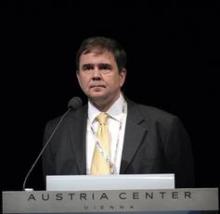VIENNA – Lenalidomide failed to increase overall survival above what was achieved with docetaxel plus prednisone in a phase III trial, leading to doubts that it has any potential value in the treatment of advanced prostate cancer.
Results from the halted MAINSAIL study, showed that median overall survival for men with metastatic castration-resistant prostate cancer (mCRPC) was significantly less for those given lenalidomide (Revlimid) in addition to docetaxel (Taxotere) plus prednisone (hazard ratio, 1.53; P = .0017).
The median was 19.5 months in the patients who received the additional lenalidomide, but has not been reached in the control chemotherapy arm.
"The addition of lenalidomide to docetaxel and prednisone in patients with castration-resistant prostate cancer did not improve overall survival," said study investigator Dr. Daniel Petrylak, leader of prostate medical oncology at Yale Cancer Center in New Haven, Conn.
"Thus docetaxel q3w remains the standard of care for cytotoxic therapy for castration-resistant disease," Dr. Petrylak added at the European Society for Medical Oncology Congress.
Although follow-up is ongoing, the study’s sponsors, Celgene, announced last November that the trial would be stopped following the advice of the study’s data monitoring committee that the results were unlikely to prove positive.
Lenalidomide, a derivative of thalidomide, has antiangiogenic and immunomodulatory effects. It is approved for use in the management of multiple myeloma and myelodysplastic syndromes (MDS) in the United States. Early clinical data suggested that it might have antitumor activity in men with CRPC when used as a single agent and when used in combination with docetaxel and prednisone. The MAINSAIL findings do not support this hypothesis.
The trial involved 1,059 men with mCRPC who had received no recent (up to 3 years) chemotherapy. They were randomized to receive 21-day cycles of docetaxel (75 mg/m2 on day 1), prednisone (5 mg twice daily on days 1-21) with (n = 533) or without (n = 526) lenalidomide. Treatment was until progression, with the survival end points assessed every 3 months for up to 5 years after treatment discontinuation.
The median age of patients in the lenalidomide-containing and lenalidomide-free arms was 69.6 years and 68.6 years, respectively. Baseline characteristics were well balanced. The median number of cycles received was six in the lenalidomide-containing and eight in the lenalidomide-free arms, respectively.
The secondary end point of progression-free survival (PFS) also showed no added benefit of lenalidomide. The median was 45 weeks in the lenalidomide-containing arm vs. 46 weeks in the control arm (HR, 1.32; P = .0187). Overall response rates were similar in patients with a confirmed prostate-specific antigen response.
"The three-drug regimen was associated with greater toxicity than [was] a two-drug regimen in this patient population," Dr. Petrylak said. Indeed, there was significantly more neutropenia (21.7% vs. 16.3%), febrile neutropenia (11.8% vs. 4.6%), diarrhea (7% vs. 2.3%), and pulmonary embolism (6.5% vs.1.5%) reported in the experimental arm vs. the control group.
The lack of effect on overall survival might be related to a number of factors, Dr. Petrylak suggested. "It may be attributed to shorter treatment duration, lower dose–intensity docetaxel, and earlier treatment discontinuation," he noted.
"Pharmacokinetic interactions could not be ruled out and further analysis is underway to elucidate the observed results in the lenalidomide arm," added Dr. Petrylak.
The study was funded by Celgene Corporation, the manufacturers of Revlimid. Dr. Petrylak disclosed receiving research funding and being an advisor for Celgene and Sanofi-Aventis.



